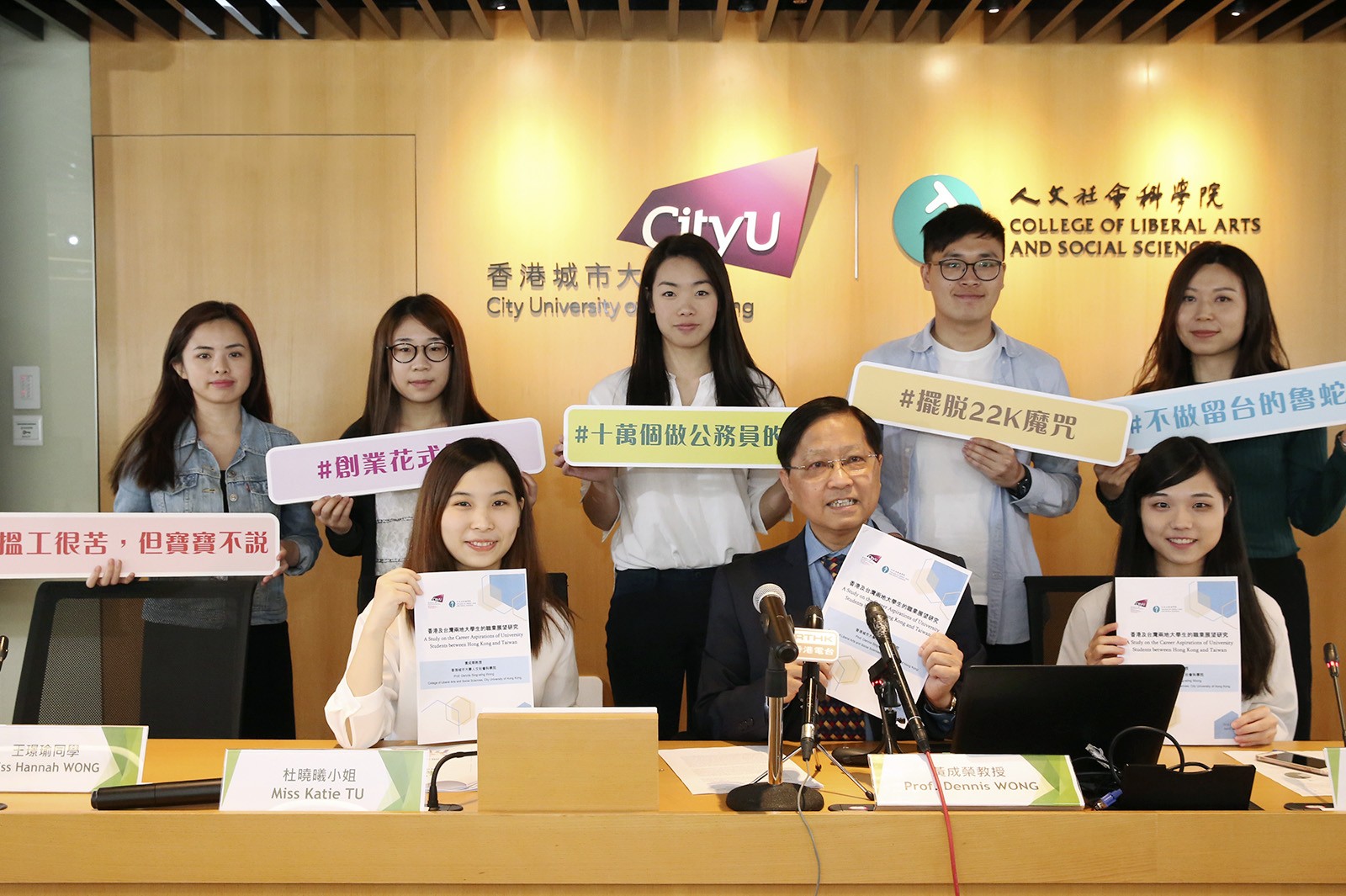CityU study finds different career aspirations between Hong Kong and Taiwan university students
A research project found significantly divergent views between university students in Hong Kong and Taiwan regarding future career development, such as the industries they want to join, their willingness to work overseas, and entrepreneurial aspirations. The survey results were published by City University of Hong Kong (CityU) on 12 April.
The research project, titled “A Study of Career Aspirations between university students in Hong Kong and Taiwan”, was conducted by a team led by Professor Dennis Wong Sing-wing, Associate Dean of CityU’s College of Liberal Arts and Social Sciences. A total of 1,159 students from six universities in Hong Kong and Taiwan were interviewed in January. The aim of the study was to get their views on their future career development, including the factors they considered important for employment, salary expectations, willingness to work overseas, interest in starting their own business, and employment capabilities.
The respondents differed widely in their interest in starting up a business, with more than 66% in Taiwan interested compared to only about 42% in Hong Kong. Professor Wong indicated that this reflects differences in the economy and culture of the two places. Another possible factor was the difference in resources and support provided to young people for entrepreneurship, he added.
The types of businesses that respondents considered setting up were also quite different between the two places. Hong Kong students mostly preferred the arts and creative industry (19.1%) or tutoring and education sector (8.7%), while Taiwan students’ first and second choices were information technology and networks (22.9%), and the arts and creative industry (19.6%), respectively.
There was a significant variation in the sectors that students would consider joining upon graduation. While about 32% of Hong Kong students would like to join the public administration, social and personal service sectors, only 8.5% Taiwan respondents indicated a similar interest. The most popular industry among Taiwan students was manufacturing and construction trades (about 24%), while the top choice of Hong Kong respondents was the civil service (50.2%). In contrast, only 16.1% of Taiwan students indicated the same interest. This may be attributable to the difference in compensation packages and the political climate between the two places.
The salary expectations were also different. About 61% Hong Kong students expected a monthly salary in the range of HK$11,001 to HK$17,000. This was similar to the average salary for graduates 10 years ago, reflecting the drop in income for local university graduates. Forty per cent of Taiwan students expected a monthly salary of HK$7,001 to HK$9,000, compared to only about 2% of Hong Kong students, mostly likely due to the difference in median income and living standard between the two places.
While 62% of Hong Kong respondents indicated a willingness to work overseas, about 82% of Taiwan were interested. This 20% difference may be due to economic factors, since Hong Kong people enjoy a higher salary and lower taxes than Taiwan people do. In Taiwan, although people enjoy low taxes and low consumer prices, the lower wages make working overseas more attractive. When asked which other country they would like to work in, most young people in both places preferred Europe and the US (Hong Kong: about 36%; Taiwan: about 55%). Interestingly, compared to 46% of Taiwan students who were willing to develop their career in the mainland, only 28% of Hong Kong students would consider doing the same.
The factors for considering jobs in both places were similar for students in both places. They emphasised most whether the job suited their interests (Hong Kong: 72.7%; Taiwan: 74.8%), then salary (Hong Kong: 57.3%; Taiwan: 62.4%), and third, career prospects (Hong Kong: 56.5%; Taiwan: 48.8%). Job location was only a minor factor (Hong Kong: 13%; Taiwan: 20.3%). It was noteworthy that fewer than 20% of respondents in both places would consider whether the nature of the job could contribute to society (Hong Kong: 16.6%; Taiwan: 18.8%).
Students in both places shared the same views on individual employment capabilities. In order of importance, the attributes that they stressed were communication skills, interpersonal skills, work experience, computer skills and clerical competence. In this ever-changing world with more and more degree holders, they felt knowledge learned in class had become less important in the workplace and that personality and life skills, such as communication skills, interpersonal skills and practical work experience, were more important for career success.
Based on these findings, Professor Wong and his team made the following suggestions:
| 1. | Start life planning early |
| Not all young people are suitable for starting a business, and not all entrepreneurs become successful. It is important to help young people understand the concepts behind starting a business and encourage them to begin life planning early by providing career counselling to them. | |
| 2. | Develop more industries suitable for young people |
| In order to encourage more local graduates to stay in Hong Kong for career development, the government should establish a stable job environment and boost upward mobility. It is also important to develop more industries suitable for young people to utilise their strengths: for example, jobs related to art and culture, creative media, and cybernetics. | |
| 3. | Increase resources and support for young entrepreneurs |
| Government departments, non-governmental organisations and universities should work together to provide more resources, training and space to help young people start a business with lower costs. | |
| 4. | Provide pre-employment counselling and support for university students |
| Most companies emphasise the job applicants’ personal qualities and work experience. To enhance university students’ local and international competitiveness, different parties should allocate resources to provide more internship opportunities for university students to acquire work experience. |
